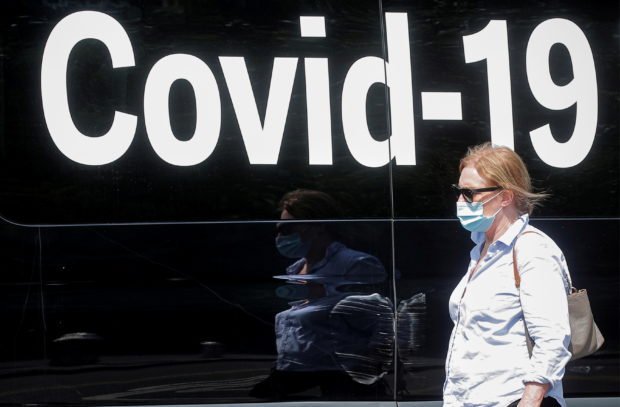
A woman wearing a mask passes by a coronavirus disease mobile testing van, as cases of the infectious Delta variant of COVID-19 continue to rise, in Washington Square Park in New York City, July 22, 2021. REUTERS FILE PHOTO
SINGAPORE — The Delta variant of the coronavirus has played havoc with governments’ plans to return life to some sense of normality.
Fresh outbreaks fueled by the highly infectious strain have forced major cities in China, Australia, the Philippines and elsewhere back into lockdown and spurred the authorities, particularly in Asia, to reimpose harsh restrictions as low vaccination rates leave people vulnerable to Covid-19.
Economies have taken a hit as manufacturing hubs like Thailand and Vietnam see their supply chains interrupted. Factories making goods for global brands are halting work and potentially missing out on the crucial holiday shopping season in major markets.
The wave of new infections has also seen the likes of Israel, Britain and the United States scramble to reinstate mask recommendations even among the vaccinated, as data emerges to show that more fully vaccinated individuals are also catching the Delta strain, and might be just as likely to spread it to others around them.
The Delta variant, first identified in India, has become by far the most dominant strain in many countries: It now accounts for almost all new Covid-19 cases in the US, Britain, Russia, Germany, South Africa and Singapore, among other countries.
‘Breakthrough’ cases
Studies show that the variant to date is the fastest, fittest and most formidable version of the Sars-CoV-2 virus, which causes Covid-19.
: People wearing protective masks stroll by the Bosphorus, amid the coronavirus disease (COVID-19) outbreak in Istanbul, Turkey February 25, 2021. REUTERS FILE PHOTO
Scientists estimate that it is roughly 50 per cent more contagious than the Alpha variant first found in Britain, which in turn was about 50 per cent more contagious than the original strain detected in the Chinese city of Wuhan.
It has also proven more potent than its predecessors, capable of infecting fully vaccinated people.
Still, such individuals – even if infected with Covid-19 – remain far less likely than those who are unvaccinated to fall severely ill, require hospital care, or die from any known variant of the coronavirus.
US data shows that infections, hospitalizations and fatalities remain rare among those who are fully vaccinated.
More than nine in 10 of all new cases, hospitalizations and deaths in US states that reported on Covid-19 from the beginning of the year occurred among those who were unvaccinated or yet to be fully vaccinated, according to the Kaiser Family Foundation, a US non-profit organization that has been collecting and analyzing data on Covid-19 vaccinations.
In Singapore, the fully vaccinated made up about four in 10 of all new cases over the past month – a surprising statistic that can be explained by the fact that around 70 per cent of the population have already been fully inoculated, so the probability of encountering an infection in a vaccinated individual is significantly higher.
Aggressive contact tracing and testing measures would also have identified mild or asymptomatic infections that might not have surfaced otherwise.
Significantly, not one of the fully vaccinated people who were infected died, and current data shows that only one is in intensive care.
Health experts stress that cases of fully vaccinated individuals becoming infected with Covid-19, commonly called “breakthrough infections”, do not imply that the vaccines are ineffective.
“The risk (of infection) among vaccinated people should be closer to 0.0 per cent everywhere, but the fact that they are not is less a matter of some failure of the vaccines themselves than the fact that the virus is spreading so widely,” Dr James Hamblin, a public health policy lecturer at the Yale School of Public Health, wrote in his online health bulletin on Friday.
“The more people who refuse to get vaccinated, the more vaccinated people will get infected.”
Separately, the preventative medicine physician wrote on Twitter: “No one… ever claimed vaccines will stop the virus from landing on you. Vaccines prevent serious illness. They do that very well.”
Transmission risks
What about the chances of fully vaccinated people infecting others around them with the virus? The jury is still out on this.
In a study last month, Chinese researchers reported they had found early evidence that while those who are vaccinated and infected with the Delta strain do not necessarily get sicker, they do become more contagious and for longer.
The researchers said those infected with the Delta variant had on average about 1,000 times more virus in their respiratory tracts than people who caught the original strain.
A food delivery worker rides in the central business district of Sydney on June 26, 2021, as Australia’s largest city entered a two-week lockdown to contain an outbreak of the highly contagious Delta variant. AFP FILE PHOTO
COVID vaccines are prepared at a clinic on August 04, 2021 in Ferguson, Missouri. AFP FILE PHOTO